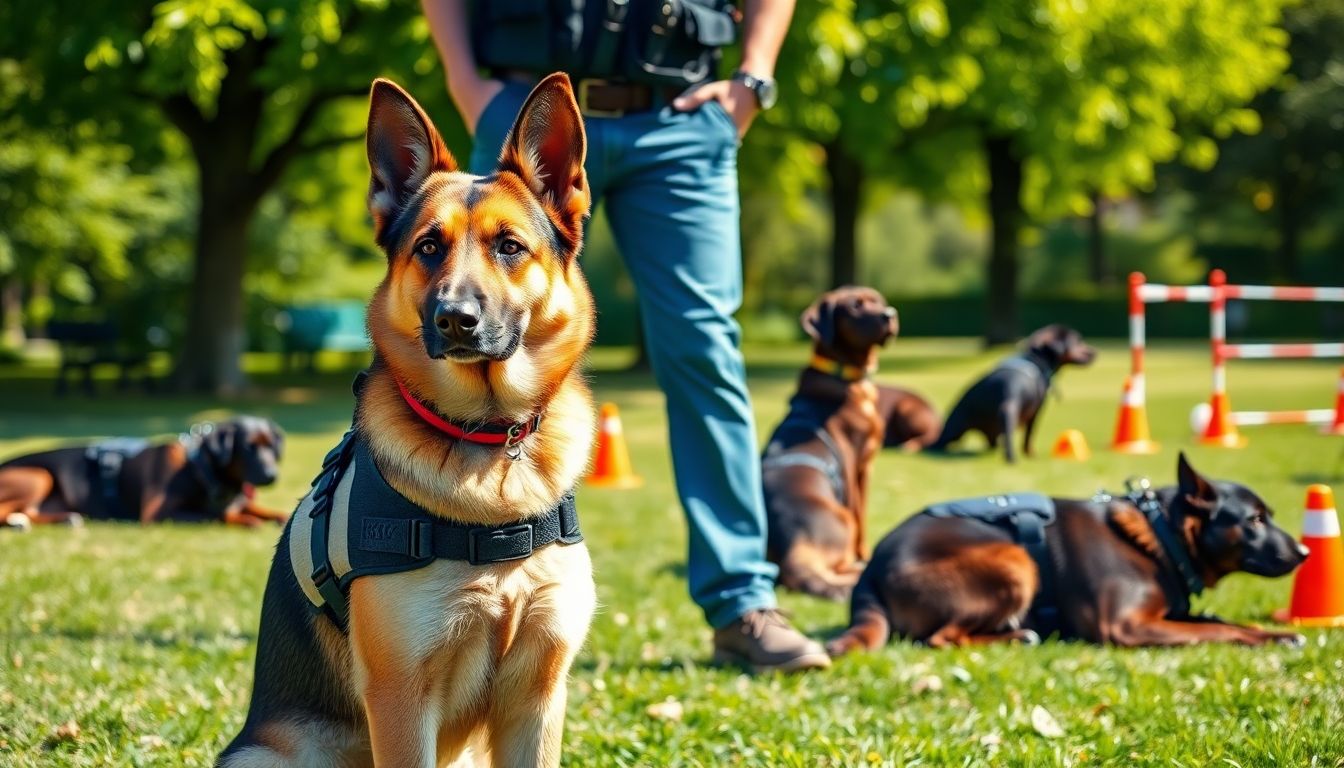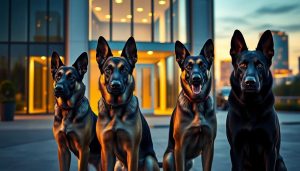Introduction
Security dogs are the major figures when it comes to guarding and securing properties, individuals, and even borders. How strong and alert they are entirely depends on how well cared for they are. Keeping a dog properly tends to prolong its working life, increase its efficiency, and keep it happy. The more people rely on security dogs in police stations, private fences, and personal homes, the more imperative it becomes to understand what they need. If the dog stays healthy and happy, it will perform well. Shield your investment and your peace of mind from the first day with rightly personalized care.
Understanding Role and Needs about Security Dogs
Responsibilities of Security Dogs
Security dogs do a lot more than just look fierce. They were entrusted with guarding, patrolling, and alerting for any danger. Quite a few of them are trained to face threats without hesitation. They assist crowd control, find out illegal activity, etc. This type of work needs a considerable amount of burning energy, focus, as well as high alertness. Therefore, their training must match the hard tasks that they face every day in reality.
Main Features of a Good Security Dog
There are particular attributes that best security dogs show. Being confident, loyal, and calm during pressure are other essential qualities. High intelligence facilitates quick learning while agility acts as their motion keep active. They can change from quite to very alert and back again within seconds. Some breeds of the utmost common among these breeds are German shepherds, Belgian Malinois, and Rottweilers. They are known for being courageous, feisty, and energetic.
Legal and Ethical Considerations
Security dogs being ethically treated are part of respect to their wellness. Laws govern licensing, training, and handling. Always use humane methods. Good licensing shows that you are committed to responsible care. Remember that these dogs are partners, not tools. Laws and ethical standards benefit all-around, even your dog.
Proper Nutrition and Health Maintenance for Security Dogs
Balanced Diet for Optimal Performance
A security dog is not a table-scraps dog. The diet has to be full, comprising high-protein quality, healthy fats with essential nutrients to help their muscles and sharpen their senses. Commercial dog food formulated for working dogs has proven to be a very good option. Some owners would opt for the homemade meals, but they should meet, in terms of nutritional value, what a good pre-made diet would be. Consultation with a vet often helps in the best plan to make.
Routine Veterinary Care
Regular medical checkups keep health problems at bay. The proper vaccinations such as rabies, distemper, and parvovirus keep security canines free of diseases. Control of parasites for such pests like flea, ticks, and worms. A routine health screening captures the problems early. Watch for symptoms of sickness; limping, lack of appetite, and unusual behavior are some of them.
Exercise and Mental Stimulation
Physical activity is very important. Schedule daily walks, runs, or training sessions. Mix your routines to prevent boredom and stress. Puzzle toys, scent games, or obedience drills make excellent substitutes along with physical exercise. Happy, alert protectors are tired dogs.
Grooming and Hygiene
One should keep its dog cleaning to avoid health problems. Regular bathing eliminates dirt together with bad smells. Nail trimming, ear cleaning, and brushing teeth should be done weekly. Hygiene encourages scent-detection capabilities and infection prevention, which would otherwise interfere with work. Cleanliness begets confidence and comfort.
Training and Socializing Security Dogs
Basic Obedience and Advanced Commands
Start with the basics of obedience. Sit, stay, come, and heel are foundational. Consistency makes commands clear. Advanced training includes keeping control in the kind of situation that is high-stress. Protect commands such as “bite,” “guard,” and “release” are essential. Use positive reinforcement to encourage good behavior.
Socialization with Humans and Other Animals
Proper socialization helps your dog develop confidence while dampening aggressive instincts. Take them to busy parks or busy streets. Supervised contact teaches them how to behave properly. Avoid rushing, as overstimulation could convert to fear rather than control.
Specialized Security Training
Security dogs are trained in specialty skills. Bite work teaches them to use control aggression. Alert training might involve a dog signaling someone if a threat is present. Work with a professional trainer to tailor a curriculum to your dog’s specialty. Keep in mind, it takes practice to keep skills sharp and reliable.
Reinforcement of Training Matches Regularly
Learning never stops. Repetition will improve skills while keeping focus with praise as well as treats and cues. Govs them good habits in addition to sharpening the focus of the dog. Training also bonds and builds trust between a dog and an owner. It makes a special tie between two working partners.
Safety Precautions and Handling Tips
Proper Handling and Restraint
Strong enough leashes and harnesses that are size appropriate should be used. One should practice handling in such a way that it avoids injury. Be alert to the possibilities of stress-lip licking, yawning, or a stiff stance. When one handles his dog gently, it reduces tension ever and thus keeps the training positive.
Prevention of Attachments and Incidents
Introduce new people or animals slowly. Initially, keep unknowns confined, as in attached leashes. Maintain control with commands. Never leave your dog unsupervised with strangers until full trust is developed, thus minimizing accidents and ensuring the safety of everyone.
Conclusion
Taking care of security dogs comprises of far more than providing them with the right equipment and commands. It is all about well-balanced nutrition, ongoing intense training, and a safe environment. You give the care, and you get the returns: a loyal, serviceable protector. Follow these simple tips to enjoy extending your dog’s time of quality service while ensuring a happy, healthy life. A star-rated dog is your best partner in security.









